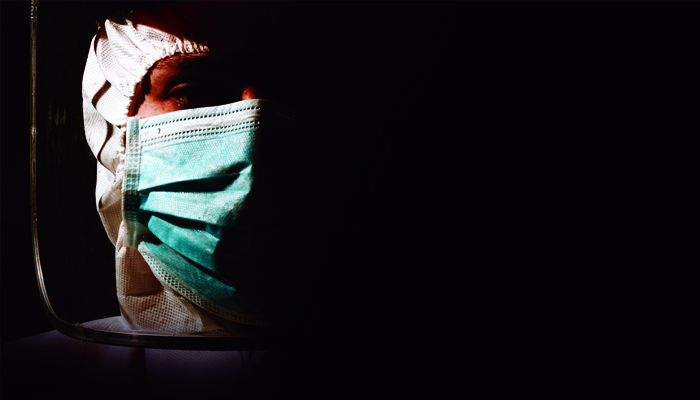
Muscat: There are four main factors that determine the severity of COVID-19 in patients, and their chances of recovery from the disease, say doctors in Oman.
A person’s natural immunity, the strain of the virus that has infected them, the extent to which the virus has spread in their body, and any other existing health problems they have, influence whether they will make a full recovery, or succumb to the disease.
Immunity – a person’s natural ability to fight off diseases – is by far the most important factor in combating the coronavirus, and the factors that determine this are often hereditary, i.e., passed down from one’s parents.
“If your parents have strong immunity, then it is likely that you will also have a better ability to fight off diseases,” said Dr A Basheer, a senior internist at Badr Al Sama’a Hospital. “If you have strong immunity, then it is very likely that you will only get mild symptoms and recover from COVID-19 easily.”
Immunity is not wholly dependent on hereditary factors, though. Following a proper diet and taking regular exercises are two of the best ways to naturally boost the body’s disease-fighting capabilities.
“These days, we see a lot of patients eating junk food, sugary drinks, and fatty snacks,” admitted Basheer. “These foods will not help the body fight off illnesses. Eat plenty of fruits and vegetables, keep yourself hydrated, and maintain healthy habits. Your body’s immunity will automatically improve.”
Adding to this, Dr Rasheed Ali, a specialist in internal medicine at Al Salama Polyclinic, said unhealthy habits lead to problems such as obesity, diabetes, and hypertension that doctors refer to as comorbidities, which worsen the impact of some diseases on people.
“If a patient’s viral load is high, then it is more likely they will reach the critical stages of COVID-19,” he said. “If there are 100 instances of the virus in my body, and 10,000 in yours, then the intensity of the disease and its spread in your body will be more. My ability to fight the disease also depends on my immunity.
“But if I have comorbidities, if I have hypertension, diabetes, cardiac disease, renal disease, or if I am taking an immunosuppressive drug, I will have more complications that will affect my recovery,” he added.
The initial period of the virus’ presence in the human body, explained Ali, is its most crucial. Patients intentionally coming late to hospitals to get a COVID-19 diagnosis, after they have already developed symptoms such as fever and cough, also played a role in making it more difficult for some of them to recover.
Ali also touched upon a phase in the body called viremia, which is when the virus is present in the person’s bloodstream. During this phase, treatment with anti-inflammatories and other related medicines will help the patient make a full recovery.
Once it has begun to affect other organs, however, causing the patient a lot of suffering, it is harder to treat the disease.
In this context, Dr Sathish Veluswamy, a surgeon at Burjeel Hospital, also advised people to come to hospitals early to get diagnosed, should they feel their symptoms taking a turn for the worse. He too asked people to look after their immunity, as it is one of the most important defences at their disposal against the virus.
“All individuals don’t have the same immune response: when you have the common cold, for example, some recover quickly and go about their business, whereas others have severe headaches and other problems,” he said. “Most often, immunity is familial: it is inherited from the family. Some individuals are atopic: they are more affected by diseases, while others are not.”
“There is unfortunately no system present to properly map a person’s immunity,” said Veluswamy, who added that some poor lifestyle habits – such as cigarettes and alcohol – did indirectly affect the body’s ability to fight off disease.
“Alcohol for sure definitely affects your immunity,” he explained. “Similarly, if you are a smoker, then you are weakening your lungs. This deters you from physical activities, and comorbidities like this can cause other problems such as hypertension.”
“Exercise is also a great way to boost your immunity, particularly if you undertake practices such as yoga,” he added. “There are many online instructors these days, who can help you learn it the right way.”
The doctor went on to add that people are sometimes reluctant to come to hospital to get checked up, they asked people to seek medical attention, should they feel ill or experience difficulty breathing. “During COVID-19, do not take any chances, please,” explained Veluswamy.
Another doctor in the country, Dr Rajeev Chathanath, the head of the COVID-19 unit at NMC Hospital, said that until people were eligible for vaccines, it was important that they kept their immunity levels high, and maintained the required precautionary measures.
“Immunity is governed by various factors, such as whether a person has been previously exposed to the virus, their general health status, how active they are, and their level of physical fitness,” he said. “Some people might also take medicines such as steroids for other comorbidities such as arthritis, but a side-effect of these is their immunosuppressive nature.”
Exercise goes a long way in improving immunity, added Chathanath, as does proper sleep habits and a regular diet.
“Usually, patients who present only COVID-19 with mild symptoms do not even need to come to the hospital,” he said. “They can recover at home, by drinking plenty of water, taking nutritional supplements high in vitamins, as well as getting enough rest. Unfortunately, there is not yet any anti-COVID medicine available to give to patients with mild symptoms of the disease. Depending on their comorbidities, if they have other serious illnesses, it is better for them to come to the hospital.”